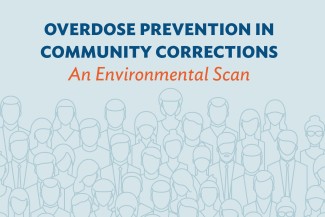Overdose Prevention in Community Corrections: An Environmental Scan

The National Council for Mental Wellbeing, with support from the Centers for Disease Control and Prevention, conducted an environmental scan to determine how overdose prevention and response efforts are currently implemented in community corrections. This effort included a literature review, 19 key informant interviews and a roundtable discussion with a diverse group of individuals with experience in community corrections, overdose prevention or harm reduction.
Key Findings
- Community supervision is changing, providing opportunities for incorporating recovery-oriented approaches.
- Community corrections officers have a distinct role in preventing overdose.
- Community corrections officers require training to fulfil their roles.
- Evidence-based interventions for individuals under supervision can reduce overdose mortality.
- Significant barriers impede the implementation of evidence-based overdose prevention in community corrections.
- Changes to community correction policy and practice are needed to support recovery-oriented approaches.
- Innovative overdose prevention interventions are happening in community corrections.
- Closer collaboration is needed between community corrections and health and social services providers.
For more information, please contact Emma Amoako at EmmaA [at] TheNationalCouncil [dot] org (EmmaA[at]TheNationalCouncil[dot]org)
Source:
This work is supported by the CDC of the U.S. Department of Health and Human Services (HHS) as part of a financial assistance award totaling $250,000 with 100% funding by CDC/HHS. The contents are those of the author(s) and do not necessarily represent the official views of, nor an endorsement, by CDC/HHS, or the U.S. Government.